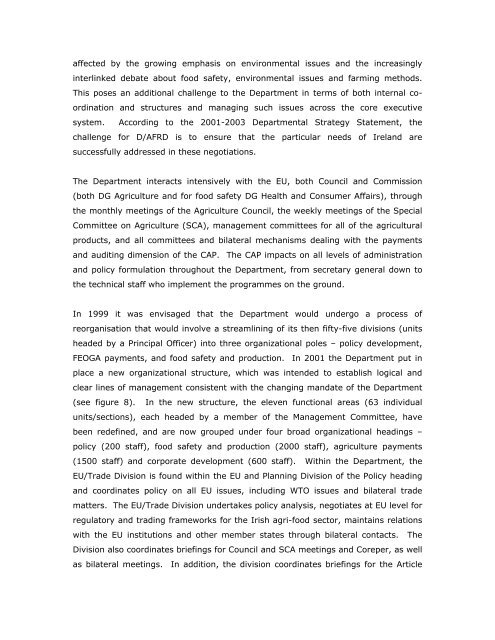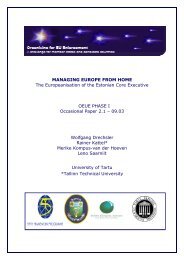Managing Europe From Home: The Europeanisation of the Irish ...
Managing Europe From Home: The Europeanisation of the Irish ...
Managing Europe From Home: The Europeanisation of the Irish ...
Create successful ePaper yourself
Turn your PDF publications into a flip-book with our unique Google optimized e-Paper software.
affected by <strong>the</strong> growing emphasis on environmental issues and <strong>the</strong> increasingly<br />
interlinked debate about food safety, environmental issues and farming methods.<br />
This poses an additional challenge to <strong>the</strong> Department in terms <strong>of</strong> both internal coordination<br />
and structures and managing such issues across <strong>the</strong> core executive<br />
system. According to <strong>the</strong> 2001-2003 Departmental Strategy Statement, <strong>the</strong><br />
challenge for D/AFRD is to ensure that <strong>the</strong> particular needs <strong>of</strong> Ireland are<br />
successfully addressed in <strong>the</strong>se negotiations.<br />
<strong>The</strong> Department interacts intensively with <strong>the</strong> EU, both Council and Commission<br />
(both DG Agriculture and for food safety DG Health and Consumer Affairs), through<br />
<strong>the</strong> monthly meetings <strong>of</strong> <strong>the</strong> Agriculture Council, <strong>the</strong> weekly meetings <strong>of</strong> <strong>the</strong> Special<br />
Committee on Agriculture (SCA), management committees for all <strong>of</strong> <strong>the</strong> agricultural<br />
products, and all committees and bilateral mechanisms dealing with <strong>the</strong> payments<br />
and auditing dimension <strong>of</strong> <strong>the</strong> CAP. <strong>The</strong> CAP impacts on all levels <strong>of</strong> administration<br />
and policy formulation throughout <strong>the</strong> Department, from secretary general down to<br />
<strong>the</strong> technical staff who implement <strong>the</strong> programmes on <strong>the</strong> ground.<br />
In 1999 it was envisaged that <strong>the</strong> Department would undergo a process <strong>of</strong><br />
reorganisation that would involve a streamlining <strong>of</strong> its <strong>the</strong>n fifty-five divisions (units<br />
headed by a Principal Officer) into three organizational poles – policy development,<br />
FEOGA payments, and food safety and production. In 2001 <strong>the</strong> Department put in<br />
place a new organizational structure, which was intended to establish logical and<br />
clear lines <strong>of</strong> management consistent with <strong>the</strong> changing mandate <strong>of</strong> <strong>the</strong> Department<br />
(see figure 8). In <strong>the</strong> new structure, <strong>the</strong> eleven functional areas (63 individual<br />
units/sections), each headed by a member <strong>of</strong> <strong>the</strong> Management Committee, have<br />
been redefined, and are now grouped under four broad organizational headings –<br />
policy (200 staff), food safety and production (2000 staff), agriculture payments<br />
(1500 staff) and corporate development (600 staff). Within <strong>the</strong> Department, <strong>the</strong><br />
EU/Trade Division is found within <strong>the</strong> EU and Planning Division <strong>of</strong> <strong>the</strong> Policy heading<br />
and coordinates policy on all EU issues, including WTO issues and bilateral trade<br />
matters. <strong>The</strong> EU/Trade Division undertakes policy analysis, negotiates at EU level for<br />
regulatory and trading frameworks for <strong>the</strong> <strong>Irish</strong> agri-food sector, maintains relations<br />
with <strong>the</strong> EU institutions and o<strong>the</strong>r member states through bilateral contacts. <strong>The</strong><br />
Division also coordinates briefings for Council and SCA meetings and Coreper, as well<br />
as bilateral meetings. In addition, <strong>the</strong> division coordinates briefings for <strong>the</strong> Article



